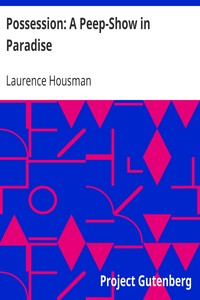| Summary |
"Possession: A Peep-Show in Paradise" by Laurence Housman is a play written in the early 20th century, around the 1920s, that explores themes of family connections, ownership, and spiritual existence. Set in a Victorian-style drawing-room, the narrative revolves around the dynamics between three sisters—Julia, Laura, and Martha—after their deaths. The play presents a unique perspective on the afterlife, questioning what it means to possess one's loved ones and to be at peace in a realm devoid of earthly concerns. The play unfolds as the sisters reunite in what they refer to as "The Everlasting Habitations," revealing their individual personalities, past grievances, and unfulfilled desires. Julia, enjoying the comfort of her new surroundings, seeks to maintain peace while Laura, recently widowed, desires to assert her ownership of her deceased husband, William. Martha navigates her role amidst the sisters' conflict, revealing her own frustration and resentment. As the story progresses, themes of jealousy, longing, and the complexities of familial love and expectation emerge, culminating in a whimsical yet poignant exploration of existence beyond death and the nature of possession itself. Through its rich characterizations and sharp dialogue, Housman critiques the notion of possession, highlighting that true belonging transcends physicality and materialism. (This is an automatically generated summary.)
|

